Online (asynchronous) during Summer 1 and Summer 2
Instructor: Melissa Bray
While this is not an Honors course, Prof. Bray welcomes Honors students of all majors and would be happy to offer Honors conversions for interested students.
The role of the mind and its effects on subjective wellbeing (e.g., happiness, stress, depression, anxiety) and the physical body will be explored during this course. The past history and current literature supporting the mind body connection, assessment, and intervention will be presented. Implications for understanding mind body health relative to quality of life will be emphasized.
Experience treatments that alleviate stress, anxiety, depression, and improve happiness as well as attention! This class will introduce you to and allow you to try out experientials such as video self-modeling, virtual reality, self-monitoring, yoga, diet/nutrition, physical activity/exercise, nature/eco health, standard muscle relaxation, relaxation and guided imagery, deep breathing, written emotional expression, gratitude writing, mindfulness, meditation, and yoga.
A glimpse into the experiential portion of the course.
More information about the instructor and the Mind-Body Health Research Interest Group.
CA 2, W.


